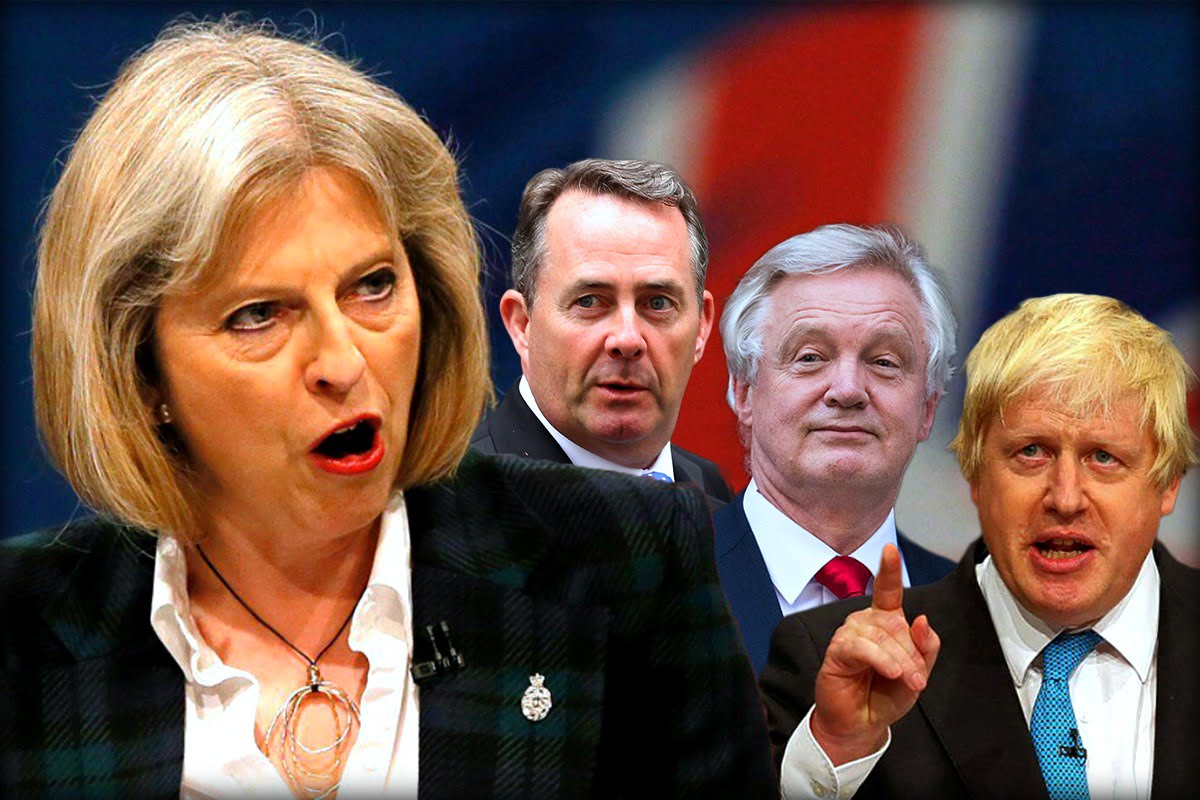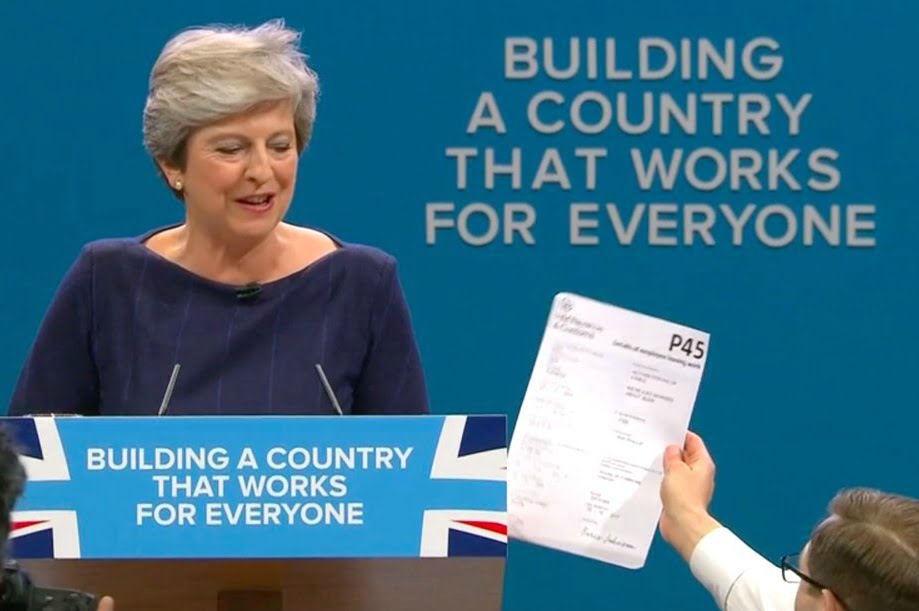Theresa May, having ridden high in the nine months following her coronation as Tory leader and prime minister back in 2016, has now met with a dastardly fall. Since the June general election result – which robbed her of her parliamentary majority – everything seems to have gone belly up.
Fatally wounded, she has been described by her old colleague, George Osborne, as “a dead woman walking”. Her disastrous election campaign was compounded by the increasing popularity of Jeremy Corbyn’s Labour Party and his left-wing manifesto.
Within days of the results being declared, Mrs May was forced to sack her closest advisers and keep her enemies in the Cabinet. Since then, with each passing day, her political authority has further drained away.
After the election, such was her diminished authority, that she soon appeared sidelined even within her own Cabinet, as different ministers squabbled publicly over their own version of Brexit. This squabbling is bound up with the anticipated jockeying for the inevitable leadership election to take place as soon as May stands down, willingly or otherwise.
Omnishambles
When May was anointed, she was heralded by the capitalist press as being a “safe pair of hands”. The new prime minister described herself and her party as providing “strong and stable” leadership. But now the whole government is in a shambles. With Brexit looming, even big business representatives have now intervened publicly to warn the government to get its act together or else.
The Tory conference was seen as an early opportunity to steady the ship. But Mrs May had a terrible conference, leading to fresh doubts about her leadership at home and abroad. Her coughing and spluttering, combined with a collapsing background and the P45 prank, summed up the image of a Tory government on the rocks. The only plus was that few people noticed that the speech itself said almost nothing and lacked any content.
Prior to the Tory conference, May had already tried to seize the initiative back over Brexit. Theresa May’s speech in Florence was supposed to draw a line under the mess of previous months, while unlocking the negotiations with a new and constructive tone.
That all fell flat. The whipped-up hopes soon faded; instead, the mood changed for the worse. Boris Johnson quickly jumped in to publicly style himself as the ‘Godfather of Brexit’, a deliberate ploy to please the Tory rank and file. He repeated the act at the Tory conference – yet May seems unable to sack him, despite every provocation.
Deal or no deal
 As October got underway, the British side had hoped the EU27 would shift their attention to trade talks and a swift agreement on a transitional deal. However, the negotiations soon ran into the ground as Berlin and Paris moved to toughen the EU’s line, delaying any hope of trade talks for later this year. To add insult to injury, Donald Tusk, the European Council president, grimly warned that negotiations could not limp on indefinitely.
As October got underway, the British side had hoped the EU27 would shift their attention to trade talks and a swift agreement on a transitional deal. However, the negotiations soon ran into the ground as Berlin and Paris moved to toughen the EU’s line, delaying any hope of trade talks for later this year. To add insult to injury, Donald Tusk, the European Council president, grimly warned that negotiations could not limp on indefinitely.
Again, the prime minister looked trapped. She soon came under increased pressure from Brexit hardliners to toughen her stance. So, once again, Mrs May begun talking up the prospects of “no deal” with cash being set aside for such an outcome. Then, with her authority on the line, she was flatly contradicted by Philip Hammond, the chancellor and champion of “soft” Brexit. Writing in The Times, he refused to commit billions in his Budget to a “no-deal scenario”.
Immediately, he came under a relentless attack, accused of backsliding and “betrayal” by the Daily Mail. Lord Lawson, the 85-year-old former chancellor, called for Hammond’s dismissal. Julia Hartley-Brewer, a broadcaster and columnist, upped the ante by suggesting Hammond should be tried for treason.
Under massive pressure, the chancellor ended up making a slip by describing the EU as “the enemy”, then embarrassingly trying to retract the gaffe. But the damage had been done. His words went down badly, especially in Berlin.
Splits and divisions
 The rift between May and Hammond is widening by the hour. The expression of her full confidence in Hammond is as convincing as that expressed in a football manager just before his sacking. The Sun quoted one cabinet source as saying that relations between the two had become so difficult, that they “can’t bear to be alone together in a room”.
The rift between May and Hammond is widening by the hour. The expression of her full confidence in Hammond is as convincing as that expressed in a football manager just before his sacking. The Sun quoted one cabinet source as saying that relations between the two had become so difficult, that they “can’t bear to be alone together in a room”.
Clearly things are going from bad to worse. The support in the opinion polls for Mrs May has dropped another three points since the start of September, as Brexit negotiations have come to a standstill and divisions within the Tory Party have forced her to delay the introduction of her flagship EU withdrawal bill. Almost two thirds of people — 64%— now believe the government is doing badly at negotiating Britain’s exit from the EU, up from 61% a few weeks ago.
The Tory Party is completely dominated by Brexiteers, who sense betrayal at every turn. While the Tory Party is supposed to represent the interests of big business and finance capital, it has instead become more and more aligned with the most backward sections of the middle class and a section of the ruling class, who do not see their interests in Europe.
In the past, Europe has split the Tory Party; now it threatens to do so again, as a layer of Tory MPs seek a “soft” Brexit, in which the UK remains within the Single Market. David Cameron attempted to bridge the divide by offering the eurosceptics a referendum on Europe, which he believed he would win. It was a gamble that backfired, one which now threatens to rip the Tory Party apart. Tory politics have become poisoned.
Standing at a cliff edge
Within this context, Mrs May is a hopeless figure being blown along by uncontrollable events. Everything has become excruciatingly difficult for her. May refused three times during a radio phone-in to say how she would vote given another chance. “I could sit here and I could say I’d still vote Remain or I’d vote Leave just to give you an answer to that question,” she told Iain Dale on LBC. “I’m being open and honest with you. What I did last time around was I looked at everything and came to a judgment and I’d do exactly the same this time around.”
A few minutes earlier, May had an awkward moment when she struggled to reassure Nina, an EU citizen resident in the UK for 31 years, about her right to stay in the event the UK left the EU without a deal. She stressed that she wanted EU citizens to remain after Brexit and that she and the government had no intention of “throwing [them] out”.
Such awkward moments and blatant evasion will simply add fuel to the fire as she risks upsetting both sides of the Brexit debate. Everything she does ends up being wrong. This is not simply personal misjudgements but is a reflection of the impasse the government is facing. It is difficult to concentrate when they are all are standing on a cliff edge.
This has allowed Nigel Farage, the former UKIP leader, to attack her commitment to Brexit. “The PM clearly does not believe in Brexit, which explains dither, delay and such a lack of leadership,” he wrote on Twitter.
Kick out the Tories! Kick out capitalism!
Theresa May and her government cannot last very long. Events will consign it to the dustbin of history. Britain faces storm and stress in the coming period, not only with a train-crash Brexit looming but a new world economic crisis on the horizon.
As Gideon Rachman commented in the Financial Times, “after a humbling and economically destructive Brexit, there will be plenty of anger to go around — and the divisions within British society will also grow.”
Labour must take advantage of this turmoil, not only to sweep away the Tory government but the entire crisis-ridden capitalist system.






